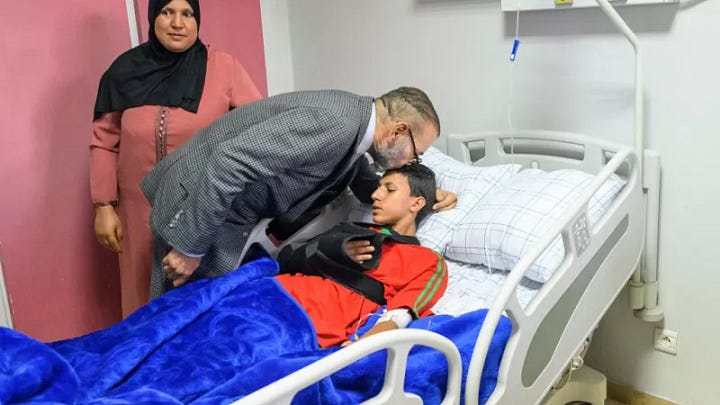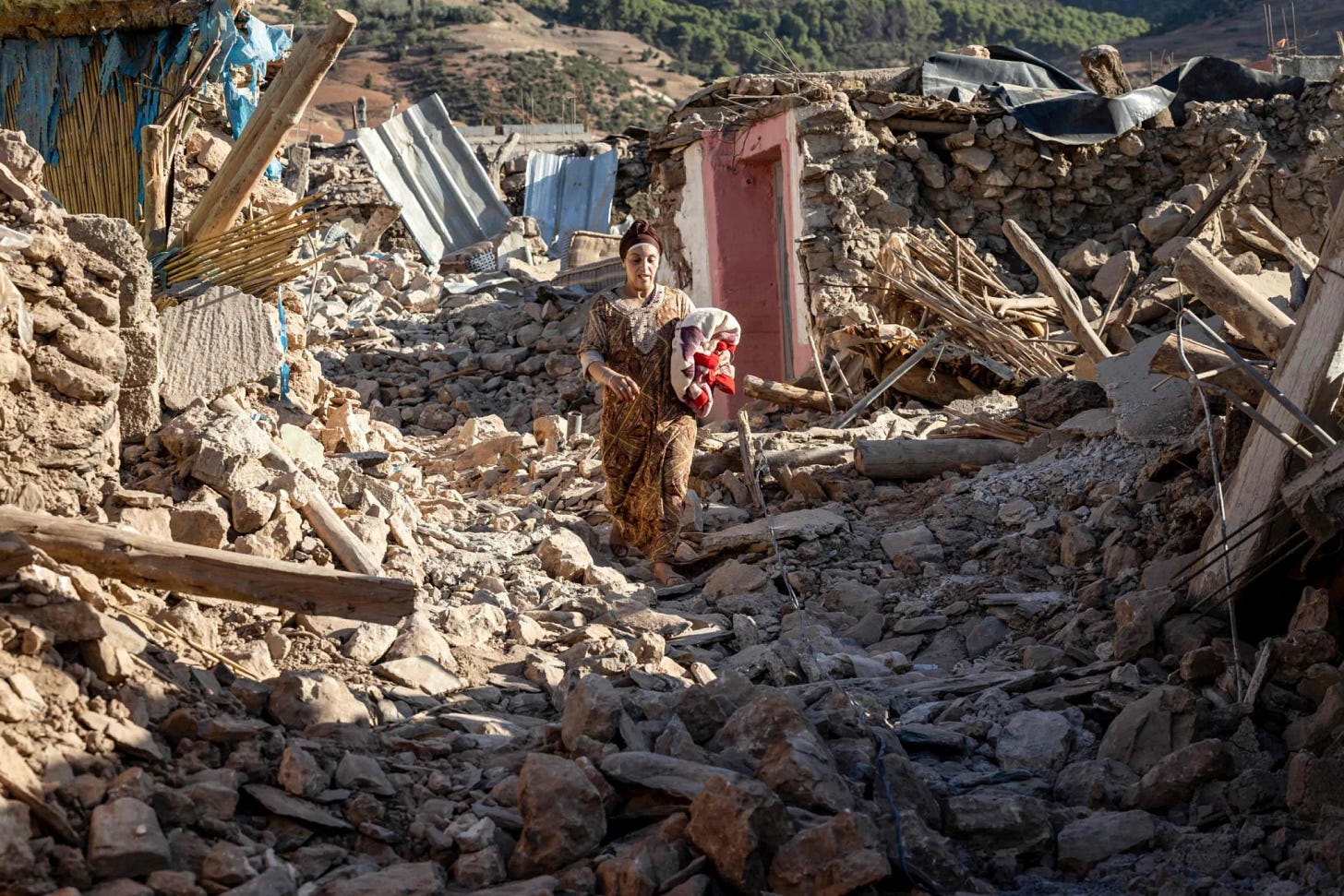Despite nearly 3,000 deaths in the aftermath of the Marrakesh Earthquake, the Moroccan government has not taken disaster aid from a long list of nations willing and ready to assist. This has led to much criticism for Morocco’s decision to not include other nations to help in a natural disaster in which 300,000 people are now homeless and thousands injured.
So far, the Moroccan government has only accepted aid from the UK, Spain, UAE and Qatar. Senegal, a West African nation, sent a search and rescue team which has assisted local gendarmes and Moroccan first responders.
Over 60 countries have offered to help with food, clothing and medical support. Offers of aid by Canada, Germany, Turkey and Algeria were also turned down by Morocco. Other countries, such as the US and France, have been completely ignored by Morocco.
“We reached out immediately to the Moroccan government,” said Secretary of State Anthony Blinken in an interview on Voice of America (VOA). “We made it very clear to them that we are prepared to assist in any way that we can. … And we are waiting for the Moroccan government how we can be of most assistance.
There is a good chance that the US, France and many other countries will be waiting a long time before they are asked to assist in the deadly 6.8-magnitude earthquake that hit Morocco last week.
I took a moment to ask some Moroccans of various socio-economic levels why their government shunned different countries which simply wanted to help Morocco to recover from the earthquake. I interviewed corporate executives, teachers, students and the random man on the street. As a result, I found some interesting comments and opinions.
It’s political, most said. Duh. But why would the Moroccan government play politics when lives were at stake? And this is where it got interesting.
I have found that the Moroccan government is serious about its sovereignty. This is a kingdom which once ruled the Iberian peninsula and extended its reach to the Senegal River. In my opinion, it is the only African nation which does not allow other countries to bully it nor disrespect its integrity.
For example, Spain is one of the countries actively assisting with recovery efforts in the High Atlas Mountain region. But a few years ago, Spain caught Morocco’s ire by allowing the leader of the Polisario, a rebel group in the former Western Sahara, to covertly visit for medical attention in Madrid. That territory is part of Morocco. Period. Even maps which suggest differently are not allowed into the kingdom.
Through various diplomatic and strategic actions, Morocco basically spanked Spain and forced their neighbor to accept and respect the territorial sovereignty of Morocco. If not, Spain, despite its excellent search and rescue teams, would not be helping with this disaster.
France is another issue.
“We are not on good terms with them politically speaking,” said Fouad, an English teacher from Azrou, Morocco. “We objected to their offer. And we don’t need their help because they stabbed us in the back.”
Morocco is a former French colony. But diplomatic relations have broken down between the two countries to the point that Morocco currently has no ambassador in France. And visits by French President Emmanuel Macron have been constantly postponed. In the bigger picture, when the French speak, Africans no longer listen.
Why would Morocco snub the US?
“We are an ally to the USA,” said Fouad. “Our bond with the Americans is unshakable
We were the first country to have recognized America's Independence.”
All of this is true, but I have a theory as to why US aid is not accepted in this crisis. I think that Morocco, like the rest of the world, sees America bogged down in the Ukraine-Russia War and limited in its ability to address its own disasters in the US.
Some of my interviewees said American aid always comes with strings attached.
Most of these rejected countries offering aid are simply sending the monies to non-governmental organizations (NGOs) which rarely gets to the people needing assistance. These NGOs certainly help with education and development projects but they have an agenda too.
Morocco is an emerging nation with an efficient police and military force, massive earth-moving equipment and a sense of community that is exemplary.
Moroccans from all parts of the country have arrived in the Marrakesh region with food, clothing, and supplies. Private corporations have come together to ship large tents with flooring in a coordinated effort. The flooring is important because winter is coming and it will be cold and rainy. The homeless will have a secure place to rest their heads.
There are resources in the country to provide for the victims of this disaster as opposed to massive loads of aid arriving in the country and sitting on the tarmac of airports, said one university student named Imane.
A nation of self-reliance
A friend of mine who I traveled with to Mauritania was moved to action. Ali Benyazid was in Casa during the earthquake. He flew back to Al Hoceima to get his gear and then to Marrakesh to participate in search and rescue.
“Time is of the essence,” Ali told me. “If we wait a few days more, people are going to die.”
Sadly, the roads to the most devastated regions were blocked by fallen boulders and stones. Clearing the roads took days even with the heavy equipment available.
Another reality is that Morocco was not prepared for an earthquake. Most of the buildings in the villages are made from mud brick. It is fascinating to see them make the bricks from the local earth, but they are worthless during a severe earthquake. There was an additional quake which measured 4.9 which caused many other weakened buildings to fall after the initial tremor.
King Muhammad VI has taken direct criticism for not taking the aid from the numerous nations which offered help.
“The earthquake makes him look like a head of state with his back to the people,” wrote Spain’s El Mundo in an editorial.


I can assure you that King Mohammad VI will personally involve himself in the care and restoration of his subjects most affected by the earthquake. I have seen him do it before in other crises. He has been sick, but he will continue to uphold his obligation to the Moroccan people.
Yesterday, he went to Marrakech and greeted and hugged injured patients in a local hospital. His Highness is much beloved and very connected to the spirit of community here. He gave blood like all the thousands of volunteers. Through his largess and directives, there is an efficient blood donation system, specialized medical clinics, and modern equipment to save lives. Moroccans work with what they have and come together in moments like this.
I heard of many people in Ouarzazate whose homes was destroyed but other families took them in. This is common here. Food is shared and all eat from the same plate and drink from the same glass. Despite wealth and poverty, there is common language, culture and obligation to be of service to others.
Another local story owner I know named Eddat traveled to the High Atlas mountains to put his children in school and is stranded by the earthquake. He was able to get his mother out of the house in time, but his son was buried in the rubble. Fortunately, they were able to dig the boy out with minimal injuries.
The Moroccan sense of community brings with it a stronger sense of self-reliance.
It will take time, but they will rebuild the roads and infrastructure damage and the kingdom will maintain its sovereignty and continue its rich legacy and history.





